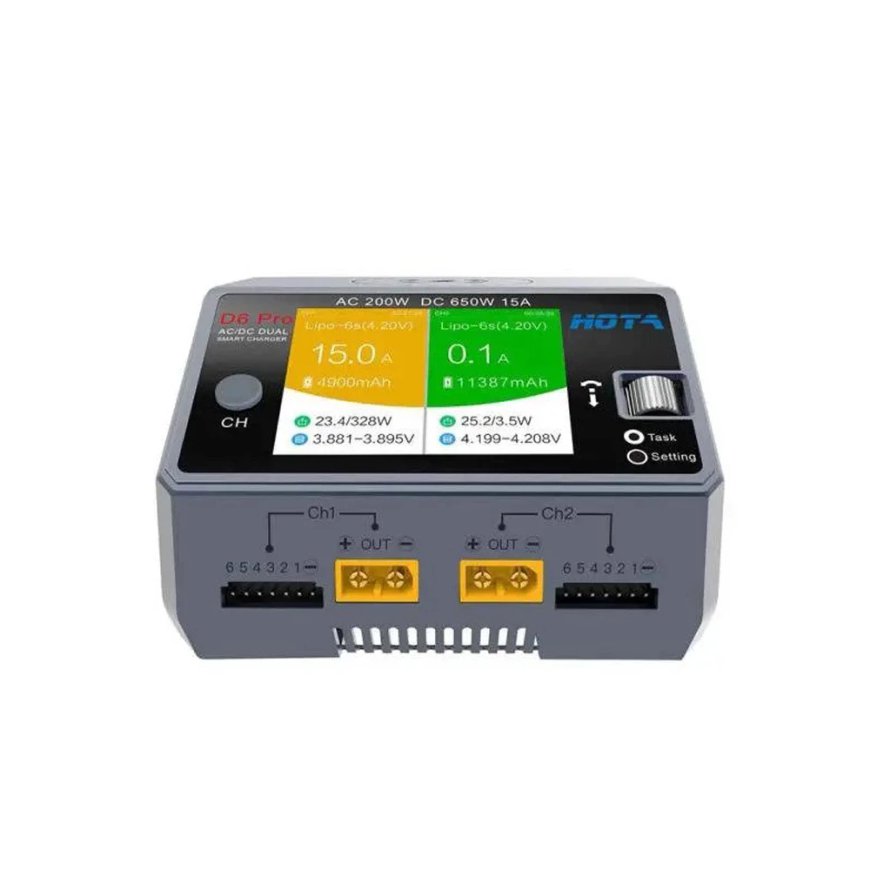The Essential Guide to RC Battery Chargers: Keeping Your RC Batteries in Peak Condition
Discover how to keep your RC batteries performing at their best with our essential guide to RC battery chargers. Learn about types, features, and maintenance tips for peak condition.

Remote-controlled (RC) vehicles, from cars to planes to boats, are a thrilling hobby for enthusiasts of all ages. However, to ensure these high-performance machines operate at their best, it's crucial to have a reliable RC battery charger. In this guide, we'll explore why having the right charger is important, how to choose the best one for your needs, and some tips for maintaining your RC batteries.
Understanding RC Batteries
Before diving into the world of RC battery chargers, it’s essential to understand the role of RC batteries. These batteries are the lifeblood of your RC vehicles, providing the necessary power to drive motors, servos, and other components. The most common types of RC batteries include Nickel-Cadmium (NiCd), Nickel-Metal Hydride (NiMH), and Lithium Polymer (LiPo). Each type has its specific requirements and characteristics, so choosing the right battery charger is crucial.
Why the Right RC Battery Charger Matters
An RC battery charger is not just a convenience but a necessity for several reasons:
1. Battery Health:
Using the correct charger ensures that your RC battery is charged at the right rate and voltage, prolonging its lifespan and maintaining performance. Overcharging or using an incompatible charger can lead to reduced battery life or even damage.
2. Safety:
RC battery chargers are designed to handle the unique chemistry of different batteries. For instance, LiPo batteries require careful charging to avoid potential risks like swelling or even fire. A good charger includes safety features such as overcharge protection and balance charging to mitigate these risks.
3. Performance:
Properly charged batteries deliver optimal performance. A well-maintained battery can provide better runtime, more power, and overall enhanced performance for your RC vehicle.
Choosing the Right RC Battery Charger
When selecting an RC battery charger, several factors should be considered:
1. Battery Type Compatibility:
Ensure the charger supports the type of RC battery you use. Some chargers are versatile and can handle multiple battery types, while others are specialized. For example, a charger compatible with LiPo batteries should have a balance charging feature to ensure each cell is charged equally.
2. Charging Rate:
The charging rate, measured in amps, affects how quickly your battery charges. However, faster isn't always better; it's crucial to follow the manufacturer’s recommendations for charging rates to avoid damaging your battery. Most chargers allow you to adjust the rate according to the battery’s specifications.
3. Safety Features:
Look for chargers with built-in safety features such as overcharge protection, short circuit protection, and temperature monitoring. These features help prevent accidents and ensure safe operation.
4. Ease of Use:
A user-friendly interface and clear instructions are essential, especially for beginners. Some chargers come with LCD screens that provide real-time information on the charging process, making it easier to monitor and control.
5. Multi-Functionality:
If you have multiple RC vehicles with different battery types, consider a charger with multi-function capabilities. These chargers can handle various battery chemistries and come with adapters and connectors for different battery types.
Tips for Maintaining Your RC Batteries
To get the most out of your RC batteries and chargers, follow these maintenance tips:
1. Regular Charging:
Avoid letting your batteries fully discharge. For most battery types, especially LiPo, partial discharges followed by regular charging help maintain battery health. Many modern chargers can automatically stop charging when the battery reaches its full capacity.
2. Storage:
Store your RC batteries in a cool, dry place. Extreme temperatures can affect battery performance and lifespan. For LiPo batteries, it's recommended to store them at a partial charge, around 3.8V per cell, to maintain their health.
3. Inspection:
Regularly inspect your batteries for any signs of damage, swelling, or leaks. Damaged batteries should be safely disposed of and replaced to avoid potential hazards.
4. Balance Charging:
For multi-cell batteries like LiPo, use the balance charging feature of your RC battery charger. This ensures that all cells within the battery are charged equally, which helps maintain battery performance and longevity.
5. Clean Contacts:
Keep the battery connectors and charger leads clean and free from corrosion. Clean contacts ensure a better connection and more efficient charging.
In the world of RC hobbies, having the right RC battery charger is as crucial as having the right battery. It ensures your RC batteries remain in top condition, enhancing performance and safety. By choosing a charger that matches your battery type, offers essential safety features, and suits your user needs, you'll be better equipped to enjoy your RC adventures to the fullest.
Maintaining your RC batteries through proper charging and storage practices will also extend their life and keep your RC vehicles running smoothly. Whether you’re a seasoned RC enthusiast or just starting, investing in a high-quality RC battery charger and adhering to good battery maintenance practices will pay off in more enjoyable and trouble-free hobby experiences.

 Dharam
Dharam